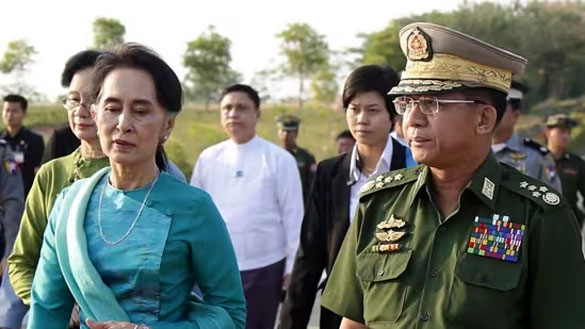
By Nava Thakuria, New Age Islam
The ongoing confrontation between the Myanmar military regime and ethnic rebels supported by civilian armed forces carries the potential to change the political history of the southeast Asian nation forever. A country of 55 million population with varied ethnicity has witnessed almost a civil war in the last few months where the military rulers have indulged in brutal crackdown against the pro-democracy activists and they are responded by public forces in various shape and sizes resulting in the death of thousands and displacement of millions of families to escape the violence erupted in various localities.
Prime Minister Senior General Min Aung Hliang and National League for Democracy leader Aung San Suu Kyi before the February 2021 coup in Myanmar.
Lately, the Arakan Army (AA), a powerful ethnic insurgent group remained active in western Myanmar, has declared their control of Paletwa, the capital of Chin State, which is adjacent to India’s north-eastern State of Mizoram). Quoting the responsible AA leaders, the media reported that the AA fighter had seized the important port town on the bank of river Kaladan near the international border with India and Bangladesh. Significantly Paletwa is an essential component of New Delhi’s ambitious Kaladan multi-modal transit transport project aiming to connect Arakan’s Sittwe port (in the Bay of Bengal) to the landlocked north-eastern region.
There were at least 29,440 armed clashes and attacks against civilians since the military coup that took place on 1 February 2021. The number of displaced people in Burma (Myanmar) reached 2.6 million, 660,000 were newly displaced since 27 October (the day the Three Brotherhood Alliance launched its combined offensive against the military regime in Naypyidaw) as the junta soldiers continued their violent actions. As the resistance forces are gaining more areas, the frustrated junta’s retaliation may only grow and thus more people will be displaced, said Alternative ASEAN Network on Burma, a regional network engaged in advocacy, campaigns and capacity building to establish a free and democratic Myanmar, in its latest report.
It also added that the alliance of three ethnic armed groups (Arakan Army, Myanmar National Democratic Alliance Army and Ta’ang National Liberation Army) had already taken over 400 junta bases (spread over 30 towns in five States and regions) since it launched ‘Operation 1027’ on 27 October 2023. The military regime led by Min Aung Hlaing engaged in 86 mass killings last year (which is up from 44 in 2022) causing the death of 1,342 anti-junta activists, asserted the forum adding that the junta lately broke the China-sponsored temporary ceasefire (following the 23 December Kunming agreement) with the Three Brotherhood Alliance members by launching air & artillery strikes on civilian population. Even the junta soldiers bombed a museum (also a proposed UNESCO world heritage site) in the Arakan (Rakhine) region
As the new year brings more news on victories by the pro-people armed forces, the junta continues to lose its control rapidly and now the soldiers have been lashing out in retaliation with large numbers of indiscriminate airstrikes, massacres and other atrocities inflicted upon the people of Myanmar, said Progressive Voice, a participatory rights-based policy research and advocacy organization, adding that Myanmar people have had enough of this violent, illegitimate military junta, and have made immense sacrifices in the nearly three years since the failed coup attempt to dismantle the military and build a new federal democracy. But, going into 2024, there is a sense of optimism among the Myanmar public catalyzed by the successes of Operation 1027 and complementary activities, it stated in a weekly briefing.
In the bygone year, a new level of coordination was seen politically and militarily in Myanmar, which is exemplified by the combined offensive against the military regime that dethroned the Aung San Suu Kyi led elected government. Massive gains in terms of territory, the loss of military junta bases, and control of key trade routes and towns mark significant steps forward for the people’s revolution. However, these are not just military victories, but political victories as the cooperation between various groups, including Ethnic Resistance Organizations (ERO), People’s Defense Forces (PDF), and National Unity Government (NUG) was established and it reveals a level of political coordination and strategy that many in the international community have yet to acknowledge.
Moving into the new year, one can expect that the momentum built by the Myanmar people with nearly three years of brave and courageous work, determination and a dignified struggle would be visible globally, commented a pro-democracy Burmese political activist, who wanted anonymity, while talking to this writer from Yangon, where he expressed hope that the international community will come forward supporting the democratic will of Myanmar people.
With more meaningful and substantial support from international actors, and with legitimate cooperation and coordination among revolutionary organizations, not only can the atrocious military regime be dismantled, but also preparations for transitional arrangements for their common political agenda of genuine federal democracy can be achieved, added the activist concluding that this momentum can translate into liberation, systemic change, and the establishment of an inclusive federal democracy with a genuine and sustained peace.
——
Nava Thakuria is a northeast India-based professional journalist who is an engineering graduate.



0 Comments
LEAVE A COMMENT
Your email address will not be published